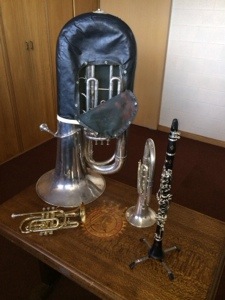A bass drum used by Salvation Army Founder General William Booth is expected to sell for a record amount this week.
Booth was never known as a musician during his lifetime, although he is well-known regarded as an innovator in the use of brass bands as an evangelistic tool in Nineteenth Century Britain. Historical records, however, show that he may have played a bass drum towards the end of his life. Salvation Army historian and museum curator Charles Mansford points to a 1913 report by Vachel Lindsay entitled General William Booth Enters Into Heaven. The report, which recounts Booth’s entry into eternal rest, clearly states ‘Booth led boldly with his big bass drum…’
Entering into everlasting bliss would normally be the last we’d see of a musical instrument, but there were at least two more sightings in that decade. Henry Lawson, an Australian journalist reported in 1915 that Booth’s drum was back on this mortal coil and touring with a band of ‘brawny lumpers’. From his report:
Oh, they drummed it ever onward with old Blood-and-Fire unfurled,
And they drummed it ever outward to the corners of the world.
Till they banged the drum in Greenland and they banged in Ispahan,
And they banged it round to India and China and Japan.
And they banged it through the Islands where each seasoned Son of Rum
Took them for new-fangled Jim Jams when he heard the Army Drum.
(For a bran’ new brand of Horrors, when he saw the Army come.)
So they banged it in the desert, and they banged in the snow–
They’d have banged the Drum to Mecca! with the shadow of a “show.”
(But Mohammed cut their heads off, so they had to let it go.)
This report finishes with an account of the Drum’s tour of Australia. It should be noted that Lawson suggests in this report that Booth’s Drum was also known as ‘the Drum of Glory’ and may have originated in the East End of London. Mr Mansford is not able to confirm this claim.
Lawson reported to The Bulletin in 1917 another sighting of Booth’s Drum in an unnamed town in rural Australia, where it was heard ‘sobbing soft and low.’
From that point there have been no confirmed sightings of the drum. However, with some clever detective work Mr Mansford followed a few leads, and last year hit the jackpot when he found it lying in a band room cupboard in a Salvation Army Hall in the town of Tibooburra in outback New South Wales, Australia.
“It was incredible,” Mr Mansford said. “I’ve been chasing this thing around the globe for years. I always suspected it ended up in Australia, and there it was, sticks and all!”
Asked about his plans for the drum, Mr Mansford said, “The Tibooburra Corps, which owns the drum, have agreed to allow me to sell it. It will go to auction next week. We hope it will be bought by a private collector who will allow me to display it in my museum in Leeds.”
Envoy John Franks, Corps Officer of the Tibooburra Corps, declined to comment, but did say the Corps hopes to be able to buy a new drum kit with the proceeds.





Recent Comments